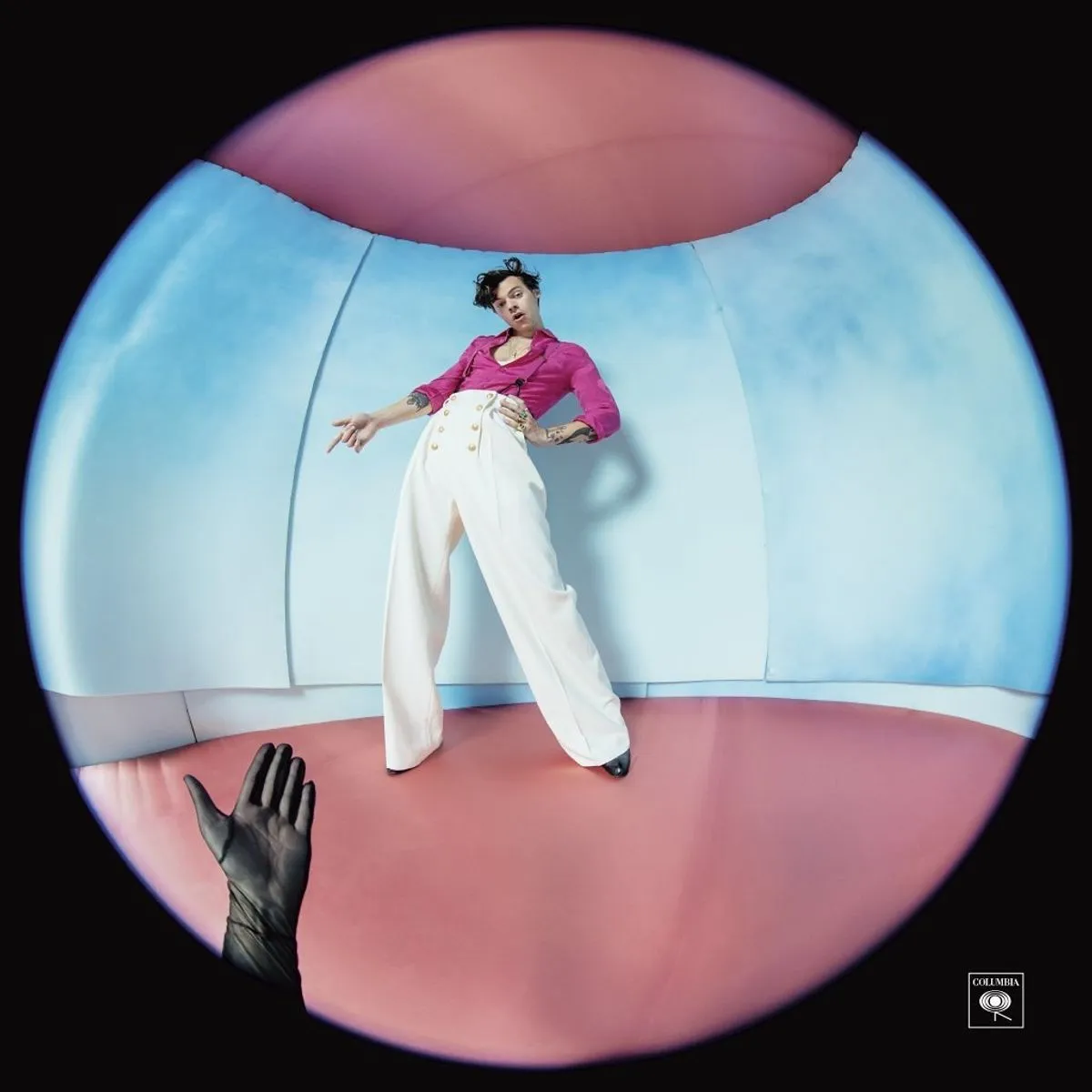

At first, Cherry sounds like just another breakup ballad — until Camille Rowe’s French voicemail turns it into Harry’s rawest confession yet.
In the world of modern pop music, few songs manage to strike a balance between lyrical intimacy and public intrigue the way Harry Styles’ 2019 ballad “Cherry” does. Hidden within his Grammy-nominated album Fine Line, the track has become one of Styles’ most dissected works — not because it was his biggest radio hit, but because it carried a personal voicemail from his ex-girlfriend, the French-American model and actress Camille Rowe. That single detail transformed the song from a melancholic breakup track into an almost voyeuristic experience for fans, offering them a direct portal into the singer’s heartbreak. But why has this voicemail continued to spark curiosity years later? And what does it reveal about the way Styles intertwines real life with his artistry?
The Origins of “Cherry”
When Harry Styles released Fine Line in December 2019, most of the world’s attention immediately gravitated toward hits like “Adore You” and “Watermelon Sugar.” But for fans who wanted to understand Harry beyond his pop stardom, “Cherry” became the emotional anchor of the album. Unlike his glossier singles, “Cherry” is raw, stripped-back, and steeped in nostalgia for a lost love. From its very first notes, listeners were introduced to a vulnerable side of Styles: one not concerned with stadium anthems but instead with the jagged edges of jealousy, longing, and personal reflection.

The track was widely understood to be about Camille Rowe, Harry’s ex with whom he shared a highly publicized romance between 2017 and 2018. Their breakup, covered extensively in entertainment media, left fans guessing whether Styles would ever reference it directly. He did more than that. By embedding a real voicemail from Camille at the end of the track, he confirmed what the public had long speculated — that this was not just a generic breakup ballad. It was his.
The Infamous Voicemail
Toward the closing seconds of “Cherry,” a faint but unmistakable recording begins to play. It is Camille’s voice, speaking softly in French: “Coucou! Tu dors? Oh, je suis désolée…” which roughly translates to, “Hello? Are you asleep? Oh, I’m sorry…” She continues, sounding casual, intimate, and almost mundane — speaking about a beach outing. For those who understood French, the words themselves were not earth-shattering. But the context was.
Here was Harry Styles, one of the world’s most guarded celebrities, letting millions of strangers listen to a private fragment of his past relationship. Fans were stunned. Some described it as “heartbreaking,” others as “intrusive,” but nearly everyone agreed that it elevated the song’s emotional gravity. The inclusion blurred the line between music and reality, transforming the track into a time capsule of Harry’s real heartbreak.
Why Camille Said Yes
The decision to include the voicemail wasn’t one-sided. Styles later confirmed that he had reached out to Camille before the album’s release, asking permission to use the recording. She agreed, a move that many fans praised as an act of mutual respect and closure. In an industry where artists often mine personal relationships without consent, Camille’s participation gave “Cherry” an authenticity that cannot be faked. It also hinted at a continued mutual respect between the two, even after their romantic chapter had ended.
Themes of Jealousy and Heartache
Lyrically, “Cherry” is drenched in the pain of seeing someone you love move on. Styles openly sings about missing Camille’s voice, her friends, and — in a particularly vulnerable moment — even referencing her new partner, art dealer Theo Niarchos. For a global superstar, admitting to jealousy so directly was unusual. Pop idols are often expected to exude confidence, to appear untouchable. Yet here was Harry, admitting he still compared himself to the man who came after him.
This vulnerability resonated deeply with listeners. Breakups, after all, are universal. And hearing someone as famous as Styles confess to the same insecurities that plague everyday people only made him more relatable. Jealousy. Nostalgia. Regret. These weren’t just pop lyrics. They were emotional truths.
Why “Cherry” Stands Out in Fine Line
Fine Line is filled with vibrant highs and devastating lows, but “Cherry” occupies a unique space in the record. It isn’t the catchiest track, nor is it the most radio-friendly. Yet it has endured as one of the album’s most talked-about songs. The reason? Its honesty. Where “Watermelon Sugar” is playful and flirtatious, “Cherry” is confessional and bruised.
In a culture where fans crave authenticity from their idols, the song provided exactly that. It wasn’t a glossy love story, it was the messy aftermath. It wasn’t a fictionalized heartbreak written for mass appeal, it was one rooted in real names, real voices, and real pain.
Fans’ Obsession with the Voicemail
From the moment the track dropped, the voicemail became the internet’s obsession. On Twitter, Tumblr, and Reddit, fans translated Camille’s French words, debated the ethics of including such a personal detail, and speculated about Harry’s emotional state when recording the song. For many, the voicemail wasn’t just an Easter egg — it was the key to understanding the entire track.

Even years later, YouTube reaction videos and TikToks resurface with fans discovering the voicemail for the first time. Some describe it as “spine-chilling.” Others call it “the ultimate heartbreak detail.” It continues to provoke the same fascination because it feels both intimate and universal — the kind of detail you might overhear if you stumbled upon someone else’s life at the exact wrong moment.
Camille Rowe: The Silent Muse
Camille’s role in “Cherry” cemented her place in Harry’s artistic story, much like how other muses have shaped music history. She isn’t mentioned by name, yet her presence is undeniable. For fans, she became more than just “Harry’s ex.” She became the voice that closes one of his most haunting tracks.
Interestingly, Camille herself has rarely spoken publicly about the song. Her silence has only fueled speculation. Was it closure for her too? Did she see it as an act of art, or simply an intimate gift to Harry’s fans? By leaving those questions unanswered, she remains a figure of mystery and fascination.
The Legacy of “Cherry”
Now, years after its release, “Cherry” continues to stand as one of Harry Styles’ most personal and poetic works. It never climbed the charts like his pop anthems, but in many ways, it achieved something far more powerful: it made fans feel like they were standing in Harry’s living room, hearing the echoes of a love that once was.

Its legacy isn’t measured in streams or awards, but in the way it lingers. For every fan who has replayed that voicemail just to feel closer to the story, for every heartbroken listener who finds their own pain reflected in Harry’s words, “Cherry” remains unforgettable.
Conclusion
“Cherry” is more than just a breakup ballad. It is a rare moment where a global superstar allowed his audience to peek behind the curtain and witness a piece of his private life. Through its stripped-down sound, painfully honest lyrics, and the haunting voicemail from Camille Rowe, it captures what so many pop songs miss: the messy, unglamorous truth of heartbreak.
For Harry Styles, it was an act of vulnerability. For Camille, it was an act of generosity. For fans, it was a revelation. And for music history, it remains proof that sometimes the smallest, most personal details — like a voicemail at the end of a song — can echo louder than the biggest pop chorus.
Because long after the charts have moved on and the radio hits have faded, one question still lingers: What does it mean when the world’s most private superstar decides to let us hear the voice of the one who broke his heart?


















